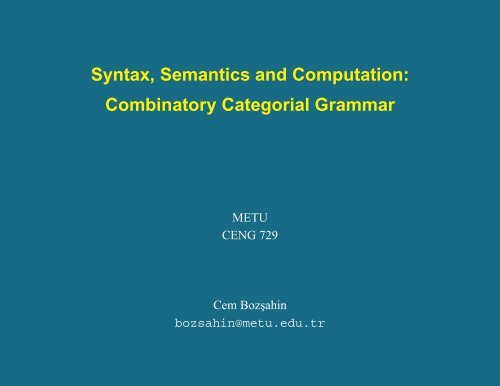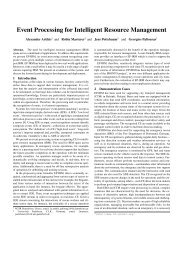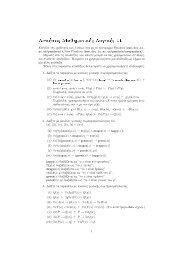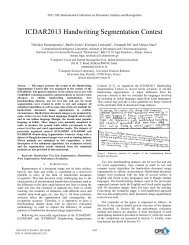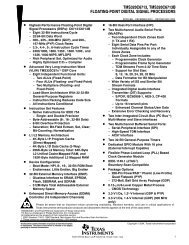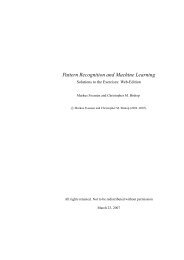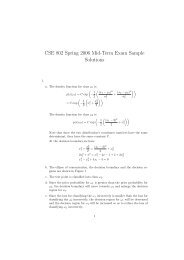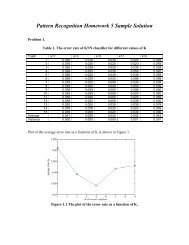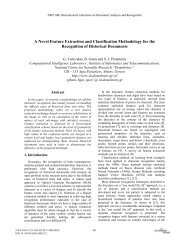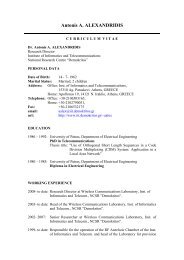Combinatory Categorial Grammar
Combinatory Categorial Grammar
Combinatory Categorial Grammar
You also want an ePaper? Increase the reach of your titles
YUMPU automatically turns print PDFs into web optimized ePapers that Google loves.
Syntax, Semantics and Computation:<br />
<strong>Combinatory</strong> <strong>Categorial</strong> <strong>Grammar</strong><br />
METU<br />
CENG 729<br />
Cem Boz¸sahin<br />
bozsahin@metu.edu.tr
Currently, two strands of generativism stand out in linguistics:<br />
Transformationalism: If you get your syntax right, you get your semantics<br />
for free, with a helping hand from extraneous devices such as transformations,<br />
checking operations, and movement.<br />
Language is structure-dependent, which can be shown by trees as structural<br />
descriptions (SDs).<br />
Radical Lexicalism: We cannot get syntax right unless categories are semantically<br />
well-motivated, and this involves combinatorial meaning. And<br />
then you get your semantics for free, with no extra help.<br />
Structure-dependence of language is better reflected by the notion of types,<br />
rather than SDs.<br />
1
Co-determination of syntactic and semantic types predict certain constructions<br />
universally.<br />
The notion of computation in radical lexicalism is a completely transparent<br />
process, simply projecting what’s coming from the lexicon.
(1)<br />
Interfaces and the Lexicon:<br />
Lexicon<br />
π<br />
µ<br />
hit := (S\NP)/NP: hit’<br />
σ<br />
Σ<br />
Π Μ<br />
2
<strong>Categorial</strong> <strong>Grammar</strong> (CG) is unique in its treatment of the notion of “possible<br />
category”, and how syntax can be made completely type-dependent,<br />
rather than structure-dependent, with transparent semantics.<br />
<strong>Combinatory</strong> <strong>Categorial</strong> <strong>Grammar</strong> (CCG) is unique among categorial grammars<br />
in its treatment of constituency, (un)bounded dependencies, and binding.<br />
There have been no syntactic variables in CCG ever since its inception (Ades<br />
and Steedman, 1982, written 1979), and no other grammar than a lexicalised<br />
grammar, therefore there can be no locus for movement-like operations<br />
to arise.<br />
With the Minimalist Program’s (MP) recent use of one binary combinator<br />
(Merge), and attempts to subsume Move under Merge (Epstein et al.,<br />
1998), theories seem to converge, differences narrowing down to the notion<br />
of “possible category.” (see Steedman 2005 for more discussion).<br />
3
.. ’units’ and ’grammatical facts’ are only different names for different<br />
aspects of the same general fact: the operation of linguistic<br />
oppositions. So much so that it would be perfectly possible to<br />
tackle the problem of units by beginning with grammatical facts.<br />
(F. de Saussure, Cours de Linguistique Générale, 1916:168).<br />
Four criteria for tests for grammatical constituents and constituent<br />
boundaries: (Noam Chomsky, LSLT, 1956/1979:210)<br />
a. The rule for conjunction<br />
b. Intrusion of parenthetical expressions<br />
c. Ability to enter transformations<br />
d. Certain intonational features<br />
4
• Constituency is something to be accounted for and explained,<br />
• rather than defined by a theory.<br />
• Only (c) above is a theory-specific definition of constituency; others<br />
are empirical criteria.<br />
to-infinitive n. A conventional label for an infinitival verb phrase preceded by the formative<br />
to, as in Lisa wants to buy a BMW. In traditional grammar, such a sequence as to buy was<br />
regarded as a single form, the so-called ‘infinitive’ of the verb buy, but this analysis is re-<br />
jected by all contemporary theories of grammar: all possible tests point to the conclusion<br />
that the sequence buy a BMW is a constituent (a verb phrase), and hence to the conclu-<br />
sion that to buy is not a constituent of any kind. (R.L. Trask, Dictionary of Grammatical<br />
Terms in Linguistics, 1993).<br />
5
Mary wants to read and discuss the stories of Edgar Allan Poe<br />
Mary wants to read and to discuss the stories of Edgar Allan Poe<br />
Mary wants to try to read and to be able to discuss the stories of Edgar Allan Poe<br />
Mary wants—I think—to read the stories of Edgar Allan Poe<br />
Mary wants to discuss—or read?can’t remember—the stories of Edgar Allan Poe<br />
Mary wants—I think—to discuss—or read? can’t remember—the stories of Edgar<br />
Allan Poe<br />
6
Clearly we may say that if presentations, expressible thoughts<br />
of any sort whatever, are to have their faithful reflections in the<br />
sphere of meaning-intentions, then there must be a semantic form<br />
which corresponds to each presentational form. [...] And if the verbal<br />
resources of language are to be a faithful mirror of all meanings<br />
possible a priori, then language must have grammatical forms<br />
at its disposal which give distinct expression, i.e. sensibly distinct<br />
symbolisation, to all distinguishable meaning-forms. (Edmund<br />
Husserl, Logical Investigations, 1890)<br />
The lexicon of a given language is a finite subset of the set of<br />
all categories, subject to quite narrow restrictions that ultimately<br />
stem from limitations on the variety of semantic types with which<br />
the syntactic categories are paired in the lexicon. Mark Steedman,<br />
The Syntactic Process, 2000:32<br />
7
• Category: a label (symbol, feature bundle etc.) for the purpose of<br />
capturing a linguistic distinction.<br />
• If they were to be lexicalised, there should be countably infinitely many<br />
syntactic categories.<br />
• Every syntactic category determines a set of structured meanings (logical<br />
form—LF), because it is made of substantive categories (nouns,<br />
verbs etc.).<br />
• Every LF (and some language specific settings, such as directionality)<br />
determine a set of syntactic categories.<br />
8
man := N: man ′<br />
the := (S/(S\NP))/N: λpλq.the ′ (px)(qx)<br />
some := (S/(S\NP))/N: λpλq.exists ′ (px)(qx)<br />
sleeps := S\NP: λx.sleep ′ x<br />
hits := (S\NP)/NP: λxλy.hit ′ xy<br />
reads := (S\NP)/NP: λxλy.read ′ xy<br />
that := Scomp/S fin : λx.x<br />
that := (N\N)/(S\NP): λpλq.and ′ (px)(qx)<br />
that := (N\N)/(S/NP): λpλq.and ′ (px)(qx)<br />
NP ↑ = S/(S\NP)<br />
IV = S\NP TV = IV/NP<br />
GQ(g) = λpλq.g(px)(qx)<br />
iv(p) = λx.px tv(p) = λxλy.pxy<br />
some := NP ↑ /N: GQ(exists ′ )<br />
sleeps := IV: iv(sleep ′ )<br />
hits := TV: tv(hit ′ )<br />
reads := TV: tv(read ′ )<br />
that := (N\N)/IV: GQ(and ′ )<br />
that := (N\N)/(S/NP): GQ(and ′ )<br />
Systematicity is not only vertical (cross-categorial), but horizontal as well:<br />
categories and semantic types correspond in non arbitrary ways.<br />
9
The lexicon is really an appendix of the grammar, a list of basic<br />
irregularities. This is all the more evident if meanings are taken<br />
into consideration, since the meaning of each morpheme belongs<br />
to it by an arbitrary tradition. (L. Bloomfield, Language, 1933:274)<br />
• Modern incarnation of grammar-lexicon dichotomy appears to originate<br />
from Bloomfield—and adopted by Chomsky (1995:130)<br />
“We distinguish the lexicon from the computational system of a language,<br />
the syntax in a broad sense (including phonology).”<br />
• For Chomsky, any systematicity in the lexicon is a missed generalisation,<br />
i.e. it belongs to grammar, cf. (1965:167) through (1995:130).<br />
10
Even when lexicon is considered to be a part of the computational system,<br />
the dichotomy prevails (Reinhart and Siloni, 2004, p.160):<br />
“Unlike approaches that decrease the role of the lexicon from an<br />
operative component to a list of items (for example, Borer, in this<br />
volume; Embick, in this volume; Marantz 1997), we assume that<br />
the lexicon is a computational component, where derivational operations<br />
can apply.”<br />
“Further, we attribute the somewhat different nature of reflexive<br />
verbs in Hebrew, Dutch, and English vs. Romance to the distinct<br />
component of grammar in which the operation applies: lexicon vs.<br />
syntax.”<br />
11
• CCG argues that this dichotomy gets in the way of our understanding<br />
of how syntax (in narrow—combinatory—sense) can shape possible<br />
human lexicons.<br />
• i.e. The substantive categories of the lexicon are instantiations of the<br />
formal categories of Universal <strong>Grammar</strong> (UG), therefore represent a<br />
continuum.<br />
• Languages differ only in their lexicons (called Radical Lexicalism by<br />
Karttunen 1989). ∗<br />
• By implication, any combinatory difference must be lexically specifiable.<br />
∗ We might call grammar-lexicon ‘grammaticon’ to avoid the orthographic dichotomy as<br />
well.<br />
12
*References<br />
Ades, A. E. and Steedman, M. (1982). On the order of words. Linguistics and Philosophy,<br />
4, 517–558.<br />
Chomsky, N. (1965). Aspects of the Theory of Syntax. MIT Press, Cambridge, MA.<br />
Chomsky, N. (1995). The Minimalist Program. MIT Press, Cambridge, Mass.<br />
Epstein, S. D., Groat, E., Kawashima, R., and Kitahara, H. (1998). A Derivational Approach<br />
to Syntactic Relations. Oxford University Press, Oxford.<br />
Karttunen, L. (1989). Radical lexicalism. In M. Baltin and A. Kroch, editors, Alternative<br />
Conceptions of Phrase Structure. University of Chicago Press, Chicago.<br />
Reinhart, T. and Siloni, T. (2004). Against an unaccusative analysis of reflexives. In<br />
A. Alexiadou, E. Anagnostopoulou, and M. Everaert, editors, The Unaccusativity Puzzle.<br />
Oxford Univ. Press.<br />
Steedman, M. (2000). The Syntactic Process. MIT Press, Cambridge, MA.<br />
Steedman, M. (2005). Interfaces and the grammar. In Proceedings of the 24th West<br />
Coast Conference on Formal Linguistics, Vancouver, Canada.


